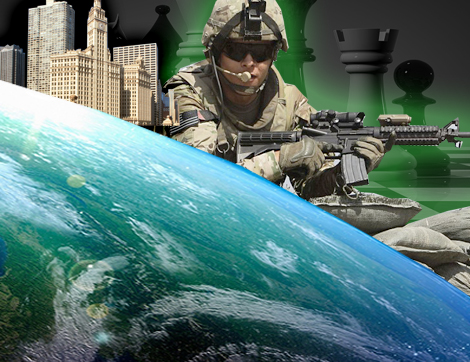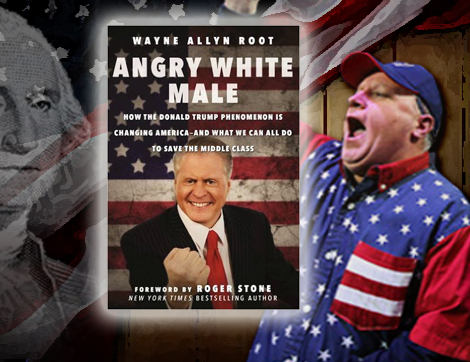
With the recent election of Republican Donald Trump, there’s renewed hope that globalism is finally dead. That may be premature, though. Global big wigs recently hosted the world’s elite in Chicago, where attendees called for more foreign intervention, the passage of a massive trade deal, and faster expansion of free trade.
By Mark Anderson
CHICAGO, Ill.—Washington’s foreign policy should forever consist of America leading and bleeding to police the world, and there will be no ironclad guarantee that other nations will lend America financial and military support on par with America’s world commitment. That’s the crux of a speech given Oct. 18 by former NATO chief Anders Fogh Rasmussen.
Speaking to the Chicago Council on Global Affairs (CCGA), Rasmussen bluntly stated: “Whether you like it or not, you’re destined to lead.”
That jolting remark, although given to the denizens of high society in the Windy City with some 75 people in attendance, was uttered as if Rasmussen was directly addressing the American people.
The CCGA is the former Chicago Council on Foreign Relations—a plutocratic cousin of the Rockefeller-linked Council on Foreign Relations in New York. The CCGA has some 200 programs a year dedicated to sustaining and expanding a worldwide economic and military order.
The former Danish prime minister, who started as an economics ministry bureaucrat in Denmark and went on to head NATO from 2009-2014, said the reason the U.S. cannot be a mere “gatekeeper” in the global crusade against terror is that, as he sees it, the threats to “freedom” are too serious—including ISIS and potentially Russia.
Therefore, the U.S. must suck it up and continue spending the multiple billions required to be the world’s invincible top cop.
His speech was riddled with references to the bleak outlook should the U.S. curl back into “isolationism.”
True to CCGA and NATO form, Rasmussen gave no middle ground, speaking as if even the slightest step backward by the U.S., anywhere in the world, would mean a total abandonment of America’s world presence and the instant rise of enemies. He ignored the idea that patrolling the world breeds enemies in the form of blowback.
Emigrate While You Still Can! Learn More . . .
What soared over the heads of the audience was the real meaning of Rasmussen’s praise of the NATO-led destruction of Libya in 2011 when he still headed the nearly 70-year-old alliance.
“Libya is a failed state,” he said, without any hint that NATO played a key role in making that happen.
Rasmussen then mused that Russian leader Vladimir Putin is “a great asset,” which drew laughter, since that “asset” could convince Europeans who live near Russia to spend more on defense and less on their welfare states, which would help the U.S. patrol the world.
Rasmussen took an unexpected step and proposed a never-heard-of “Trans-Atlantic Free Trade Area,” or TAFTA—a grid for even more corrosive free-trade deals, toward a growing transatlantic alliance that Rasmussen sees as a key goal, lest the world succumb to the nationalist-populist parties and factions that are rising in Europe and beyond.
Rasmussen made it clear that the Bretton Woods economic conference, which happened as World War II ended (under his “hero,” President Harry Truman), gave the world what Rasmussen called “a rules-based liberal Democratic world order.”
That economic order, he said almost reverently, is worth defending to the death. Yet the oath that American officials and soldiers take only says Americans should defend the Constitution from all enemies near and far and is silent on defending Bretton Woods from the same.
Other CCGA talks scheduled for late October included an appearance by British Gen. Richard Shirreff, whose provocative topic was, “Road to War: Russia, NATO and the Threat of Inaction.” Secretary of State John Kerry addressed a meeting of the CCGA on Oct. 26.
JOHN KERRY: EMBRACE FREE TRADE
Secretary of State John Kerry’s Oct. 26 address to the CCGA was an urgent call for Congress to pass the Trans-Pacific Partnership (TPP), the 12-nation trade and investment treaty that centers on the Asia-Pacific region but extends to the NAFTA nations of the U.S., Canada, and Mexico.
Kerry’s evening delivery of the Louis B. Susman lecture at the downtown Hilton could have been delivered by U.S. Trade Representative Michael Froman, as Kerry mainly offered arguments on world trade and economics, portraying the TPP as the undeniable ticket to the promised land for America and the other TPP nations that together represent 40% of world GDP.
His remarks evidently were timed to help influence Congress to approve the final TPP enactment legislation soon after the Nov. 8 election.
“If we were to see the TPP rejected, it’d be a giant self-inflicted wound on our nation,” the former Massachusetts senator told the CCGA and guests, with ample pomposity. “And our credibility as a country, with any country with which we’re trying to negotiate, would be in doubt.”
Absent the TPP, he said, American workers would be “hurt,” the economy would “slow,” and America’s ability to “advance a full range of . . . objectives in a region that’s important to our future” would falter. He didn’t say if the sun would refuse to shine.
But when Kerry says “our” future, to whom is he really referring when he speaks of the TPP’s beneficiaries?
Clues are found in other parts of his Oct. 26 speech and in two other CCGA programs just covered by this writer: the Oct. 18 speech by former NATO chief Anders Fogh Rasmussen and the Oct. 24 populism symposium. (See story on page 10 in this week’s issue.—Ed.)
In the previous article, it was reported that Rasmussen declared that Americans, “whether they like it or not,” mustn’t hesitate in their support of the U.S. being the world’s permanent police force—and that the military’s central purpose is to protect the “rules-based liberal democratic world order.”
But the current “rules-based world order” phase, born in earnest at the 1944 Bretton Woods, N.H. conference, is in essence a banker-run construct that America’s armed forces have long been deputized to protect.
The Bretton Woods agreement, a precursor to the Bilderberg group’s formation 10 years later, seeded the World Trade Organization and created the International Monetary Fund and the World Bank. It has become clearer than ever that Bilderberg’s core task is to carry Bretton Woods forward and add or modify components while keeping the basic building blocks in place through networking and status reviews.
Kerry announced an Oct. 31 London diplomatic meeting to discuss the status of Libya—a shattered nation that NATO forces all but destroyed in 2011.
He pointed to the Iran nuclear deal to prevent Iran from developing a nuclear weapon as a major diplomatic achievement, given his leading role in the talks.
He also expressed hope that the International Syria Support Group, whose members include Syria and its ally, Russia, will reach an agreement to end the warring there, toward a “secular . . . transitional government,” put in place by new elections.
But besides that brief call—behind the mask of “diplomacy”—for removing already-elected Syrian President Bashar al-Assad, and apart from his remarks on the Iran deal, Kerry sounded less like the nation’s top diplomat and more like a war cabinet member.
He spoke in often aggressive terms in Chicago—especially in his assessment of terrorism since 9-11, hammering the so-called Daesh terrorist faction.
“Daesh” is an Arabic language acronym for the Islamic State (ISIS) terrorist group. Many government figures refuse to dignify ISIS with the words “Islamic State,” so Kerry, like other officials, uses the Daesh term as a slight against ISIS.
“Daesh is guilty of genocide, and we will hold Daesh accountable,” Kerry pontificated while claiming American soldiers have liberated Fallujah and other Iraqi towns. He also claimed ISIS hasn’t had any successful offensives since May 2015.
Kerry did not mention Israel’s genocidal, apartheid policy toward Palestinians, nor was American connivance with al Qaeda in Syria—the very faction blamed for 9-11 terrorism—included on Kerry’s list of achievements to note and foes to conquer.
As a fervent believer in climate change, Kerry discounted dissent and called for a “low- or no-carbon” future, while saying Europe must continue pursuing U.S.-backed efforts to become energy independent so Europeans can cut their usage of Russian energy and economically bruise Russian leader Vladimir Putin.
Ironically, Kerry’s stated vision involves sending Europe liquefied natural gas and other “fossil fuels” whose emissions trap heat and supposedly cause global warming—a contradiction Kerry didn’t seem to catch.
Regardless, “business is business” when it comes to enforcing a rules-based world order as the new constitution of the ages.
Viewed objectively, the world order model is far more deceptive and potentially more menacing than some eventual ISIS-backed Islamic “Caliphate” that our war-prone top “diplomat” warned about in Chicago. After all, a caliphate of central bankers and their proxies is already here, and the CCGA is chief among the think tanks that sponsor the programs and compose the “authoritative” studies that keep the government-corporate-banking alliance intact and functioning.
Mark Anderson is AFP’s roving editor.


We the people must abolish the International Trade Administration, the US Department of Commerce, and all US – Free Trade Agreements.
http://howtorestoreourrepublicconstitutional.blogspot.com/
The Rothschild based money supply scheme has to end. The USA should lead the way with non-Zionist people in leadership positions. Eventually, I believe a non-monetary system would work around the world. People can decide what job they want to perform in life. Schools will be free to attend after passing exams to determine if you qualify for a particular field. All people can contribute to providing food for the masses. I have a plan written out and i know it will work. No more will we be slaves to debt.